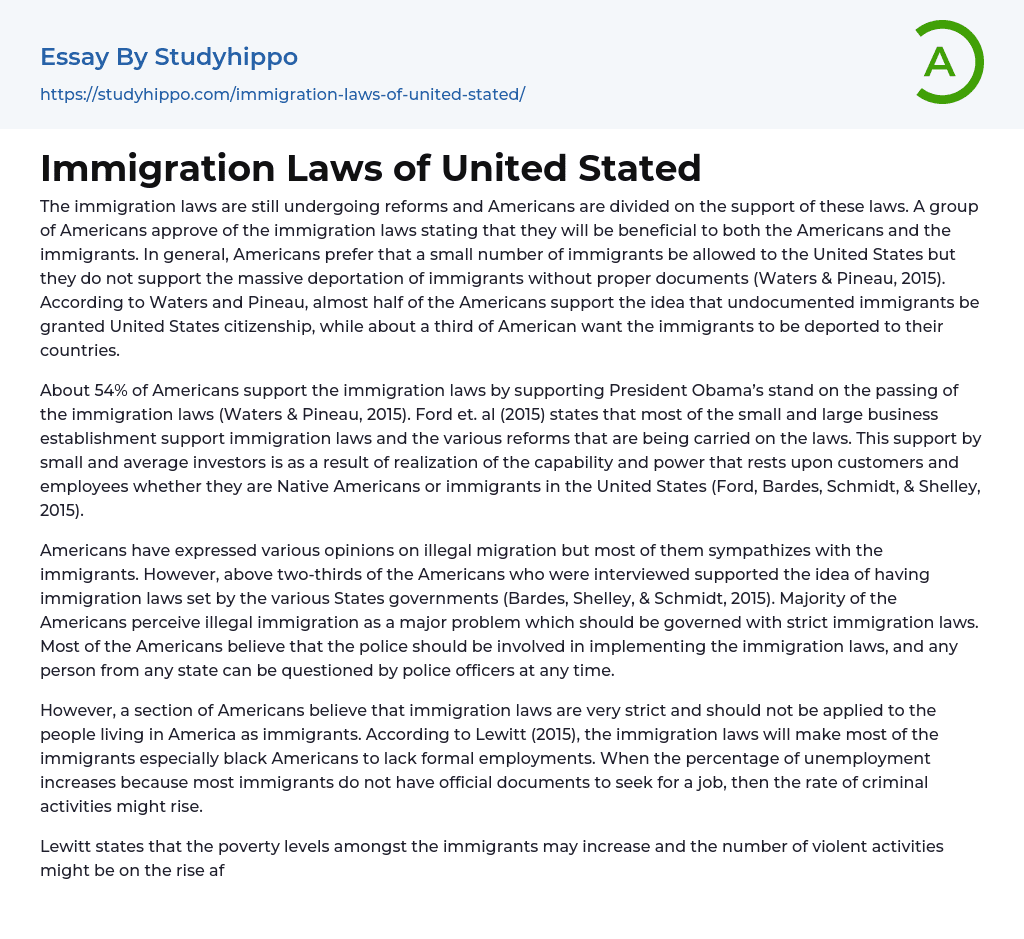Americans are currently divided on their stance towards immigration law reform.
Waters and Pineau (2015) conducted a study on Americans' opinions about immigration laws. The results showed that some Americans support these laws because they believe they benefit both Americans and immigrants. While most Americans want to limit the number of immigrants entering the United States, they do not agree with mass deportation of undocumented immigrants.
The study also revealed that almost half of Americans approve of granting United States citizenship to undocumented immigrants, while around one-third prefer sending them back to their home countries. Additionally, approximately 54% of Americans express support for both the immigration laws and President Obama's stance on their implementation (Waters & Pineau, 2015).
According to Ford et. al (2015), both small and large business establishments in the United States support immigration laws and ongoing
...reforms. Small and average investors are aware of the influence customers and employees hold, regardless of their nationality, whether they are Native Americans or immigrants (Ford, Bardes, Schmidt, & Shelley, 2015). While opinions on illegal migration vary among Americans, a majority show sympathy towards immigrants. However, more than two-thirds of interviewed Americans believe that state governments should determine immigration laws (Bardes, Shelley, & Schmidt, 2015).
The majority of Americans view illegal immigration as a major concern that necessitates strict immigration laws. Numerous individuals in America believe that law enforcement should enforce these laws and possess the power to question anyone at any time, regardless of their residency status. However, certain Americans are against the rigorous enforcement of these immigration laws and contend that they should not be applicable to immigrants who are already residing in the country. Accordin
to Lewitt (2015), implementing such immigration laws may restrict job prospects for numerous immigrants, particularly African Americans.
When immigrants lack official documents, the unemployment rate may rise, potentially leading to an increase in criminal activities. According to Lewitt, the implementation of laws may result in higher poverty levels among immigrants and subsequently more violent activities. If the Obama administration's healthcare plan is approved, immigrants will be responsible for covering the expenses of children welfare and Social Security. Consequently, enacting this healthcare plan will impose additional costs on immigrants.
Lewitt (2016) states that the United States might encounter budget deficits as it provides support to immigrants who may face financial difficulties. Some Americans propose that immigration laws should not be enforced and that immigrants should be granted free citizenship. Ewick (2015) argues that these laws can lead to family separation, increased fear, and oppression for immigrants at local, state, and federal levels. Hence, there is no consensus among Americans regarding the implementation of immigration laws due to their potential adverse effects on citizens, immigrants, and the government. The Texas judicial system plays a crucial role in restoring law and order within the State of Texas.
In Texas, the judicial system has successfully handled complex criminal cases like flag burning and capital punishment, as well as court cases related to school desegregation, school finances, sexual orientation, and the welfare of children in polygamous families.
The Texas judicial system successfully handled its largest civil case, where Texaco was held accountable to Pennzoil for an amount of $10.8 billion (Maxwell et. al., 2015). By handling various court cases in a professional manner, the Texas judicial system has earned a reputation for effectively
serving the people of the state and gaining their satisfaction.
According to Janda et. al., the Texas Supreme Court is responsible for implementing rules and procedures to ensure smooth handling of court cases in Texas. This includes a wide range of cases, such as civil and juvenile cases throughout the entire state.
One reason for the Texas population's support of the judicial system is its oversight of school admissions, discipline, and approval of law schools in the state. However, the Texas judicial system has long faced issues. Many judges, lawyers, and system members experience internal conflicts that obstruct fair administration of justice in courts. These conflicts often arise from involvement in political processes and susceptibility to corruption within politics. Despite discouragement by the State of Texas constitution and treating judges like other politicians, some still engage in politics. Consequently, they are regarded with suspicion by the public, raising concerns about their ability to deliver impartial judgments unaffected by political influence.
Additionally, the cost of legal representation is high, which introduces financial elements into the judicial system (Newell et. al, 2015). When finances are at stake, corruption tends to infiltrate the Texas Judicial system. Consequently, the presence of money erodes public trust in the courts as it leads to corruption and biased court rulings. According to Brown et. al (2015), the issues plaguing the judicial system in Texas stem from the judges themselves.
One reason for these conflicts is the elections that take place within the judicial system. The judges are so involved in politics that it leads to grievances between opposing sides. This rigorous political process results in reduced cooperation among judges when handling cases. Therefore, the judicial department
of the State of Texas needs reformations.
References
- Bardes, A. B., Shelley, M. C., & Schmidt, S. W. (2015). American Government and Politics Today: Essentials 2015-2016 Ed.
Cengage Learning.
E. (2015). Practicing Texas Politics. Cengage Learning.
Carens, J. (2013).
The text discusses two books: "The Ethics of Immigration" published by Oxford University Press in Oxford, U.K., and "The Handbook of Law and Society" written by P. Ewick in 2015.
John Wiley & Sons.
American government and Politics Today: No Separate Policy Chapters. Cengage Learning.
(2016). The Committee to Destroy the World: Inside the Plot to Unleash a Super Crash on the Global Economy. John Wiley & Sons.
(2015). Texas Politics Today 2015-2016 Edition. Cengage Learning.
Cengage Learning.
(2015). The Integration of immigrants into American society. Washington, DC: National Academies Press.




